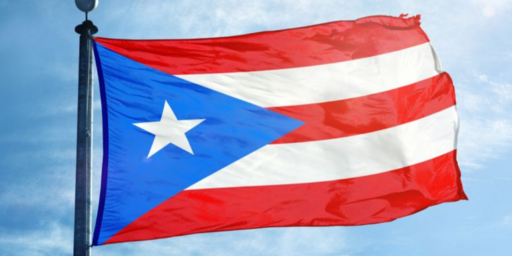Federal Government Spent $890,000 On, Quite Literally, Nothing
Ladies and gentlemen, your government at work:
If you are a federal worker on furlough this week–or an airline passenger delayed by federal furloughs–you might save your blood pressure, and go read another story.
This one is about all the money the U.S. government spends on…nothing.
It is one of the oddest spending habits in Washington: this year, the government will spend at least $890,000 on service fees for bank accounts that have nothing in them. At last count, Uncle Sam has 13,712 such accounts, each containing zero dollars and zero cents.
These are supposed to be closed. But nobody has done the paperwork.
So even now–as the “sequester” budget cuts have begun idling workers and frustrating travelers–the government is still required to pay $65, per year, per account, to keep these empty accounts on the books.
In this time of austerity, these accounts are a reminder of something that makes austerity hard: expensive habits, built into the bureaucracy in times of plenty. The Obama administration has spent the last year trying to close these accounts, with some success.
But only some.
“If anyone had kept open a bank account with no money, and was getting a charge every month, they would do everything they could to close it,” said Thomas A. Schatz, of the watchdog group Citizens Against Government Waste. But, Schatz said, the government hasn’t shown the same kind of urgency with taxpayers money.
“It’s just lack of attention to detail. And poor management,” he said. “And, clearly, the fact that no one gets penalized for paying money to keep the accounts open.”
The money spent on these empty accounts is–of course—a tiny fraction of the federal budget. But, in its own way, it is something special: Washington’s perfect waste, a rare specimen of cost untainted by any reward.
This is why we can’t have nice things.





Pfft. Spending a million on nothing is not as bad as spending a few billion on something stupid.
Keep your eye on the ball.
How much money would it cost to find, fill out, and submit the paperwork to close 13,712 accounts? My first guess: more than $890,000 (although admittedly that’s a re-occurring cost).
My question: Why does the United States government, the entity that after all creates out fiat currency, have private bank accounts at all? Surely, it has the resources to serve as its own banker?
@James Joyner:
I’m sure it those are department/project accounts that are drawn upon by mid-level managers. They represent cost control, and (of course) not every manage can (nor should) create fiat money at will.
@Franklin:
For technical detail we’d want to know the average life of the accounts, the average empty life, and the degree to which they are re-used.
If the federal government has simply been accruing empty accounts since 1945 or something, that would be kind of bad.
Isn’t the US Treasury good enough to hold government accounts? This seems like yet another instance of subsidies and privatization gone bad.
@Franklin:
I’ll do it for $100,000
@john personna: Well, sure. But why can’t the US government operate its own bank and give each department its own account, each with their own sub-accounts? I just don’t understand why we need thousands of accounts in for profit banks. The federal budget is more than 3 trillion dollars; surely, there’s an economy of scale there.
If I had a closed account that was costing me a 3 cents a year, and would require paperwork to close, yeah, I’d ignore it. That’s the analogy.
Well, find 200 more things like that and we can stop the ATC furloughs. Oh wait, we can’t. Because sequestration requires cuts to baseline budgets no matter how much extra money agencies can find.
@James Joyner:
They wouldn’t even need that, would they?
Just accept bids for who will float the empty accounts in order to maintain the full ones.
(Of course, at the levels the budget office is operating at, $1M rounds to zero. And indeed we don’t know the total [fee] picture. Maybe we pay very little for the $100B active accounts right now.)
If there are 13,172 accounts, it will take multiple people thousands of woman-hours to identify the accounts, contact the banks, and complete the paperwork to close them. Will that cost more than $890,000 itself to arrange and manage? Yes it will.
(I’m assuming woman-hours because those seem to be spent more efficiently than man-hours….)
Not necessarily. If I was getting charged $65 a year for an empty account and knew that the paperwork and phone calls to close that account would cost me, let’s say, one hour of my time and some mental aggravation, then I’d only close it if that hour was worth less to me than $65 and if I didn’t consider $65 to be a de minimis amount.
And I say this with confidence, because I’ve done exactly that, paid some fees that I didn’t need to pay because of the time-value of money.
@James Joyner: From the article:
I bolded the answer to your question.
Ugh, seriously people, read the entire article. Doug just highlighted the portions designed to make the government look as bad as possible.
I’m not sure I see a problem here, it’s a trivial amount of money. If there were actual waste that could be cut, then we’d read articles about that. Instead, we get these nothingburgers indicating that the government is run pretty efficiently.
Look, when all is said and done, complaining that the federal government spent $890,000 on nothing is like complaining that I spent ten cents on nothing. True, yes, but so trivial as to be meaningless.
@Rafer Janders: They aren’t even spending it on nothing. As the article notes, there are very valid reasons why some (certainly not all, to be sure) of these accounts remain open – because each account is carved out to track the funds for a specific grant, and cannot be closed out until the program audit for the grant has been completed.
In other words, the poeple (and I realize this does not include you) who are complaining about this are complaining about a cost associated with transparency and accountability, designed to help track expenses and reduce waste, fraud, and abuse. Yes, too many of these accounts remain open after the audits are completed, and yes, per the article, certain agencies are much better than others at closing accounts on time. However, as you note, in the grand scheme, it is an immaterial line item.
As one of the managers noted in the article states, the number of open accounts with no balance will never be zero, due to the transparency and accountability requirements associated with grant audits. If (purely as an example) there is $500 billion in grant money floating around, spending a few million dollars annually on compliance auditing is not only immaterial, its good government.
(Plus, I don’t even think these are true costs to the Federal government as a whole, given that the accounts are held in a government-run depository. The $65 annual fee is probably just a fund-accounting mechanism in order for the internal servicer to track its revenues and expenses – governmental accounting is super weird compared to business accounting.)
@James Joyner: You will never see pushback like what would happen if the government announced a plan to switch to public banking. Banks would lose tens of billions in fees charged to government agencies for providing “services”, a massive corporate welfare program. If the public saw that public banking worked they also might insist on access to such an institution, which would be the death-knell of TBTF and of rentier finance. Global financial players would be out literally trillions in profits.
It’s a fantastic idea, though.
Doug, like your blog, but please please read this Kevin Drum post about why your concern is silly:
http://www.motherjones.com/kevin-drum/2013/04/washington-post-wastes-125-news-11
Every large organization wastes at least some money. Every single one. It’s only when it’s the government that some people take it as proof that the organization has no right to exist.
Is the government still spending money on university grants for such things as why children fall off tricycles ? Are they still paying $150 for hammers for the military?
See: “top ten outrageous government grants”
Doug, Kevin Drum puts this in perspective. Note – as a lawyer, you are still morally bound to be able to do high school math 🙂
http://www.motherjones.com/kevin-drum/2013/04/washington-post-wastes-125-news-11
“But seriously, folks, “tiny fraction” barely even begins to describe this. In numbers, it represents about 0.000025 percent of the federal budget. But even that’s too small a number to really get a feel for, so let’s put this into terms that the Washington Post can understand.
Annual revenues at the Washington Post hover somewhere around $500 million. So how much is 0.000025 percent of that? Answer: $125. Would the Washington Post run a lengthy story about two empty bank accounts that the Washington Post hasn’t closed yet, which cost the Washington Post’s shareholders $125? No. The story is so self-evidently ridiculous that they’d laugh at anyone foolish enough to even mention it.”
@Rafer Janders: And even moreso if you were running a business, and had a large set of accounts, each used for a different project.
At that point, the costs of the accounts is really just part of the cost of accounting.